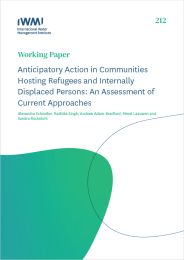IWMI Working Paper – 212
Citation:
Schindler, A.; Singh, R.; Adam-Bradford, A.; Laauwen, M.; Ruckstuhl, S. 2023. Anticipatory action in communities hosting refugees and internally displaced persons: an assessment of current approaches. Colombo, Sri Lanka: International Water Management Institute (IWMI). 24p. (IWMI Working Paper 212). [doi: https://doi.org/10.5337/2024.200]
This paper is a global literature review of anticipatory action approaches in communities hosting forcibly displaced persons. Anticipatory action, or a set of actions taken to prevent or mitigate a potential disaster before acute impacts are felt, is an essential strategy to reduce the impacts of climate change and extreme weather events. However, due to the complexity and diversity of host community environments, it has proven challenging to incorporate this approach into these contexts. This paper provides a review of the available data on water- and climate-related vulnerabilities in host communities to inform and strengthen anticipatory action approaches and climate adaptation initiatives. It also supports future research for the development of a replicable and scalable mixed-methods model called the Integrated Host Community Vulnerability Framework (IHCVF). This paper starts with a background and technical overview of anticipatory action as it is currently implemented by humanitarian and development organizations. This overview highlights the lack of research on how anticipatory action can take into account the specific vulnerabilities of host communities. The paper then provides a detailed definition of host communities, a term the authors use to refer to the context, institutions and structures within which forcibly displaced persons live, and encompasses both the hosts and the displaced. Finally, it reviews the early stages of development of the IHCVF, including operational needs, specific vulnerabilities to consider, and current gaps in the field that need to be covered with future research. Next, the paper analyzes the types of water- and climate-related vulnerabilities in host communities, and the anticipatory action approaches that organizations are undertaking in those communities, using case studies from Bangladesh, Nigeria and Sahel. The data from these case studies show how existing host community vulnerabilities and food, land and water-related stresses can compound disasters for hosts and forcibly displaced people when impacted by extreme weather events, conflict, disease outbreaks, and food insecurity. Finally, this paper ends with a few conclusions about gaps in the data, including a lack of anticipatory action strategies that prioritize long-term outcomes such as resilience building and adaptation, and the need for guidance on how to better implement anticipatory action and forecast-based humanitarian action in conflict situations. It recommends further research on water- and climate-related vulnerabilities in communities hosting forcibly displaced people to provide practical guidance to inform future programming.
ISSN 2012-5763
e-ISSN 2478-1134
ISBN 978-92-9090-960-6


